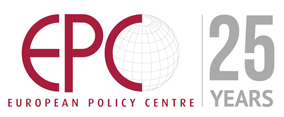(6 March, 2024 – EPC)
SPEAKERS
- Frances Burwell – Distinguished Fellow, Atlantic Council & Senior Director, McLarty Associates
- Georgina Wright – Resident Senior Fellow and Deputy Director for International Studies, Institut Montaigne
- João Vale de Almeida – Former Ambassador of the European Union to the United States
MODERATOR
- Ricardo Borges de Castro – Associate Director, European Policy Centre
The year 2024 is shaping up to be the most significant electoral year in history, with an unprecedented voter turnout of over half the global population. No date holds as much crucial importance, both nationally and internationally, as November 5, 2024. The results of the American elections could not only shape the future of liberal democracy and its institutions but also fundamentally redefine transatlantic relations and our security environment. In this context, the conference organized by EPC, held the day after Super Tuesday, aimed to deeply explore the issues of American elections. This online political dialogue addressed the underlying national and international trends in the electoral race. The event particularly focused on the state of the primaries and its implications for transatlantic relations, as well as the blocked support for Ukraine in Congress.
Evolution of the electoral campaign since Super Tuesday
According to the three speakers, the electoral campaign has shown a consolidation of the two main parties. It is emphasized that this consolidation is exceptionally early in the American system, which is usually characterized by a greater diversity of candidates. Thus, it will be an extremely long electoral campaign. Significant challenges for Trump have been highlighted by Joao Vale de Almeida, noting that he did not perform as well as expected in several states. For instance, Nikki Haley won a significant share of the votes in states like Massachusetts and Virginia, underlining the existence of a significant number of “never Trump” Republicans. On the other hand, Biden seems to fare better among Democrats than Trump does among Republicans.
Divided United States and candidates facing key issues
According to João Vale de Almeida, we know that the elections will once again pit Biden against Trump. This electoral campaign will be the longest in history, spanning 8 months until November. It will also be a close election, reflecting a divided country, with key states such as Arizona, Georgia, Nevada, Michigan, and Pennsylvania. However, we do not know what decision will be made by the Supreme Court regarding the issue of presidential impunity. Furthermore, we are unaware of how people will perceive the economy in November. Currently, voters do not reward Biden for the good state of the economy, remembering inflation. We also do not know what the impact of third-party candidates will be. Figures like Cornel West or Robert F. Kennedy Jr. could play a crucial role, especially among undecided Democrats. Finally, we also do not know what Nikki Haley’s position will be. Will she support Trump or Biden? Non-committed Democratic voters seem to largely vote as a protest against American policy towards the Israel/Hamas conflict. The existence of 91 criminal charges against Trump is mentioned, with ongoing discussions that could extend into the heart of the electoral season. The abortion policy is also highlighted as a crucial issue, mobilizing a large number of voters.
International perspectives and concerns, what about EU and NATO?
It has been noted by the three speakers that the election is both exciting and potentially (very) dangerous. Uncertainties revolve around the Supreme Court’s decision on presidential immunity, the perception of the economy, and the impact of third-party candidates. Other points include Biden’s concerns about his age, his ability to convince on his role in maintaining a healthy economy, and Kamala Harris’s less positive role. For Trump, concerns include abortion, ongoing legal affairs, association with Putin, and the support Haley has been able to gather. The implications of a Trump presidency for Europe were also discussed, with concerns about American isolationism and its impact on transatlantic relations. According to Frances Burwell, it appears that attention has turned away from Ukraine with the Hamas attack. Americans believe that Europeans are not doing enough for their security and are not spending enough on defense, securing their borders, and providing enough support to Ukraine. Americans expect Europeans to plan to spend much more on defense within NATO in the coming years. There is a strong awareness of the danger if Trump wins the election, which raises fears that a Trump victory will encourage Putin and weaken Ukraine, while hardening his position towards China, which poses problems for Europe. Finally, Georgina Wright highlighted the potentially negative impact of a Trump presidency on Europe, explaining that negative reactions should probably be expected, and mentioning the NATO summit in July. The American campaign influences debates in Europe, with a particular focus on Ukraine and security.

